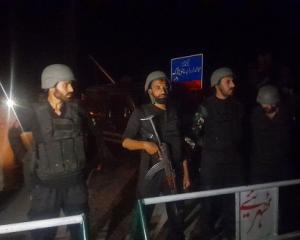Maths prodigy Gareth Williams, 31, was found curled in the foetal position inside a zipped and padlocked red hold-all in his bathtub in August 2010.
An unnamed spy who spoke from behind a screen, and a yoga expert who tried and failed 100 times to lock himself into an identical bag to see if it was possible, were among witnesses who testified during a seven-day inquest into his death.
"I am sure that a third party placed the bag into the bath and on the balance of probabilities locked the bag ... The cause of his death was unnatural and likely to have been criminally mediated," said coroner Fiona Wilcox, delivering her verdict.
She said said there was no evidence that any fellow spy had been involved, but it remained a legitimate line of inquiry.
The case has exposed failings at MI6, Britain's external intelligence agency, which failed to report Williams missing for days after he did not show up at work even though its protocol required the alert to be raised within two to four hours.
"Our grief is exacerbated by the failure of his employers at MI6 to take even the most basic inquiries as to his whereabouts and welfare which any reasonable employer would have taken," Williams' family said in a statement after the verdict.
MI6 has apologised for its failings and for causing distress to the Williams family, while police said after the coroner's verdict that they would continue their investigations.
"The inquest has raised several new lines of inquiry and the investigation will now refocus and actively pursue all the evidence heard," said Jackie Sebire, who led the investigation.
The unusual details of the case fuelled intense media speculation about what might have happened, ranging from murder by foreign spies to a sexual experiment gone wrong.
Police found make-up, a long-haired wig and unworn women's clothes and shoes worth around £20,000 pounds in Williams' flat. They also found images of transvestites, a picture of Williams wearing only boots and evidence of visits to sexual bondage websites on his computer.
But Wilcox rejected the idea that the death was linked to unusual sexual practices, noting that there was no evidence that Williams, a keen hill-runner and cyclist, was interested in claustrophilia, and that no semen was found in the red hold-all.
"I therefore wonder what was the motive for such information to have been released out to the media? I wonder if this was an attempt by some third party to manipulate perception of the evidence," she said.
Under British law, a coroner's court does not apportion blame or impose a sentence, but rather seeks to understand the circumstances of a death. But Wilcox said that countless questions remained unanswered in this case.
"Most of the fundamental questions in relation to how Gareth died remain unanswered. There has been endless speculation but little real evidence. It is unlikely this death will ever be satisfactorily explained."
Williams lived in the smart district of Pimlico, just across the Thames from MI6 headquarters, a modern fortress on the south bank of the Thames that has featured in James Bond films.
Investigations into his death were complicated by the fact that his body was badly decomposed after remaining in the bag in the August heat for a full week until he was found. This hampered the work of forensic investigators.
The experts have been unable to determine whether Williams died from suffocation or poisoning, and no forensic evidence has been found that could definitively point to another individual.
One of the policemen involved in the investigation told the inquest he had neglected to examine some of Williams' belongings found at MI6 headquarters, including memory sticks and a bag almost identical to the one in which Williams was found dead.
Wilcox strongly criticised police for leaving these items with MI6 instead of seizing them as evidence.
"This simply would not have happened had the exhibits been produced by any other party and should not have occurred in this case, since it questions the reliability of the evidence."
Wilcox said this was particularly problematic given the chance Williams could have died at the hands of an MI6 colleague.
She criticised specialist anti-terrorist branch police officers, who were in charge of gathering evidence from MI6 because of the security implications of investigating the death of a spy, for not taking any formal statements from MI6 staff.
"Lack of recall is a feature of several of the (MI6) witnesses and this may be because they were not asked to make signed statements, and they are being asked to recall evidence two years later," Wilcox said.












